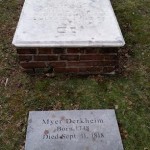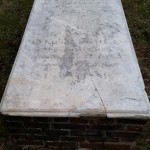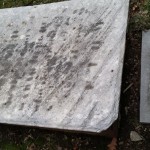Rev Meir Derkheim
מאיר ב"ר משה
Mohel, Richmond and Petersburg, VA as well as in PhiladelphiaDate of Death:
Sun. August 2, 1818 -
Tammuz 29 5578
Anyone with biographical information is asked to please send it in.
See CONTACT page for details. Thank you.
Directions to Kever: The Spruce Street Cemetery in Philadelphia is owned and managed by Congregation Mikveh Israel. Visits to this cemetery are by appointment only. Call or email the Mikveh Israel office for an appointment and expect to pay $25.
Name Listed on Cemetery Database: Mayer Derkheim
Biographical Notes:
Myer Derkheim performed his first Brit Milah (Jewish ritual circumcision) in Portsmouth, New Hampshire when he was only 26 years old. The final circumcision at which he presided as mohel took place in 1818, the year of his death. During the 44 intervening years, Derkheim traveled the length of the newly created United States and new country in which he had settled, and he officiated at the sacred rite of initiation into the Jewish faith another 75 times; each he recorded faithfully, on these pages. His peregrinations to perform the sacred task took him from Maine to South Carolina, visiting both established Jewish communities and small outposts of Jewish life in rural America. Although Jewish tradition calls for the circumcision to be performed on the eighth day after birth, a close examination of the dates of circumcision in this register reveals that, in practice, many of the circumcisions performed by Derkheim, took place much later. The high neonatal mortality rate that prevailed in the eighteenth century meant that some circumcisions were delayed for health reasons. Derkheim’s own son Moses, whose birth and circumcision are both recorded in this register, did not undergo circumcision until he was 11 months old. The dearth of practitioners of the ancient rite and the great distances between Jewish communities meant that circumcisers rarely found their way into the hinterland and some youngsters had to wait years before the mohel came. Jacob Rader Marcus, the doyen of American Jewish history, explicitly referenced the importance of Meyer Derkheim’s circumcision register as a testament to the fidelity to their faith, exhibited by the Jews of even the most distant American towns and villages. In addition to his career as an itinerant mohel, Derkheim was one of the founders of the Jewish cemetery in Charleston S.C. in Richmond & Petersburg, VA as well as in Philadelphia.
« Previous: Rabbi Yoel Tzvi RothNext: Rabbi Nisson Yablonsky »





